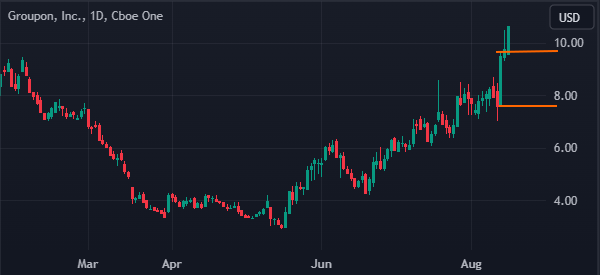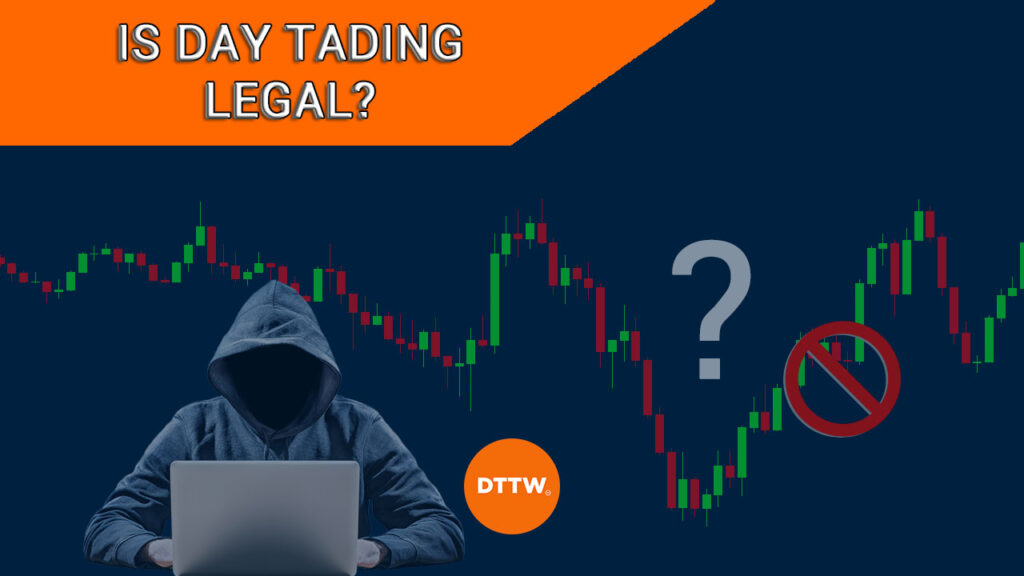A common question among most traders is whether day trading is legal or illegal. While day trading and investing are not illegal in most countries, there are laws and regulations that you must abide by.
So it is not day trading itself that is illegal, but some practices that may be implemented. In this article, we will look at whether day trading is legal and some of the top things to consider.
Table of Contents
What is day trading?
Day trading refers to the process of buying and selling financial assets like stocks, commodities, and bonds with the goal of generating a profit. It differs from investing, which is a process where people buy and hold assets for a few months or years.
A good example of this is shown below. In this chart, we see that Groupon’s shares were in a bullish trend for a while. In this case, an investor would have bought the shares from a low of $3 to almost $10. On the other hand, a day trader would have placed a buy trade at $7.6 and closed at $9.62.

Day traders don’t focus on the long-term perspective of the assets they focus on like stocks and commodities. As such, investors focus on a company’s fundamentals like long-term revenue and profitability growth while day traders focus on technical analysis and price action.
Is day trading gambling?
One of the most popular questions that people ask is about whether trading is gambling. As such, many people argue that day trading should be regulated in the same way that gambling is regulated.
Day trading has some similarities to gambling in that the two are risky ways to make money. Also, the outcome for the two is usually the same.
For example, in the two, one can make a big return or a significant loss. This view is explained by Britannica’s definition of gambling, which is:
“The betting or staking of something of value, with consciousness of risk and hope of gain, on the outcome of a game, a contest, or an uncertain event whose result may be determined by chance or accident or have an unexpected result by reason of the bettor’s miscalculation.”
However, there are differences, which explains why many gamblers are not always the best in day trading. Day trading involves predicting the direction that an asset like a stock or a commodity will move in during a certain duration. There is usually a skill behind all trading moves.
Related » Why day trading is not gambling?
Rules and laws of day trading
Day trading has several rules that people need to consider. First, there is usually a difference between day trading, swing trading, and investing. Day trading is the process of buying and selling financial assets within a single day.
Swing trading, on the other hand, is the process of identifying market moves, initiating trades, and then holding them for a few days. Investors hold their positions for a long time.
A common rule of day trading in the US is the Pattern Day Trader (PDT) rule. In the US, the PDT rule is one where brokers must classify people who execute several trades per day as day traders. Their trades must also represent more than 6% of their customer balance.
In this case, people who execute more than four trades within five days fall in this category. As a result, they are supposed to maintain a certain balance.
There are several ways for overcoming the PDT rule, including opening accounts with several companies, swing trading, joining a prop trading company, or using a foreign broker.
Securities laws and regulations
The day trading and investing industry is highly regulated around the world. In Europe, regulators implemented the MIFID II regulations that were over 30,000 pages. These regulations covered everything, including the use of leverage and marketing of financial products.
In the US, the sector is regulated by several agencies like the SEC, CFTC, and Financial Industry Regulatory Authority (FINRA) among others. The best-known financial regulator in the country is the SEC.
There are laws that govern publicly-traded companies, market makers, exchanges, and brokers. For example, companies must meet some regulations like disclosures. A publicly traded company should provide all relevant information to the market.
Some of the most popular day trading laws are on insider trading and market manipulation. Insider trading is a practice where people trade using information that is not publicly known.
For example, if an insider tells the wide about an upcoming M&A deal and she does the trade, it means that they have taken part in insider trading and can be jailed.
Also, securities laws prevent other market manipulation things like pump and dump schemes, wash trades, ramping, and lure and squeeze among others.
Further, there are tax laws that accompany day trading. In this case, traders should always ensure that they pay their taxes in order to comply with local laws. These laws differ from country to country. As such, if you are new to these, you should consult an expert.
Restrictions you can suffer for not following the law
Going against securities laws can attract severe penalties, including fines and prison time. One of the most popular cases related to Ken Griffin’s SAC Capital.
After a long time of delivering exceptional returns, Griffin was fined over $1 billion and some of his traders were locked up for years. He was also suspended from the market for a few years.
Another high-profile case was on Raj Rajaratnam, who was locked up for a few years because of security fraud and insider trading.
Brokers who suspect nefarious activities in your account can close your account and even report you to authorities.



